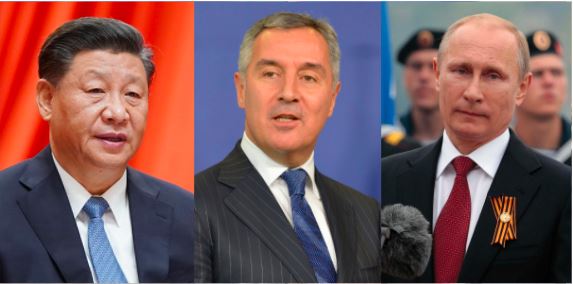Russia’s President Vladimir Putin is on a roll in Eastern Europe. First Belarus and now Montenegro, Putin is preventing countries from falling into the big Chinese debt trap. Montenegro is at the brink of getting colonised under the burden of predatory Chinese loans and the European Union (EU) has refused to help the Balkan nation. But a pro-Putin regime recently came to power in Montenegro and it seems that Russia will now bail out the Eastern European nation.
Montenegro currently owes around US $ 1 billion in debt to China for an economically unviable, 165 km long highway project. As such Beijing is waiting for a default, which will allow it to spread its tentacles deep into the Balkan nation. The first option for Montenegro would have been to approach the EU, but the EU has already said no. Therefore, Montenegro has one last option to save itself- Russia.
Montenegro finds itself encroached on Chinese debt only because its former President Milo Djukanovic, an autocrat who ruled the Balkan nation for nearly 30 years, literally played into China’s hands. Milo first made a mistake by giving the green signal to the 165 km long highway project and then made an even bigger mistake by borrowing 85 per cent of the project cost from the infamous Export-Import Bank of China.
It was only a matter of chance that Milo got thrown out of power in the August 30 elections last year, and in a firm setback to Chinese President Xi Jinping’s BRI ambitions in the Balkans, Milo got replaced by a pro-Russian alliance. Therefore, Beijing no longer enjoys any political leverage in Montenegro and at least within the Balkan nation, there is a sense of consciousness against the mounting Chinese debt.
Initially, Montenegro wanted the EU to help it out. But an EU spokesman reportedly told SCMP that it “does not repay loans of partners which they took from third parties”. The EU official did express concern “over the socioeconomic and financial effects of some of China’s investments in Montenegro”. But the underlying issue is that the EU has refused to offer any concrete help.
So, the situation is clear, the present regime in Montenegro doesn’t want to become China’s lackey. It wants to find a way out of the mounting Chinese debt. Montenegro’s finance minister Milojko Spajic even made it clear that the new regime wants closer ties with Brussels than with Beijing. Yet, the EU is turning down an easy chance to score a victory over Beijing.
On the other hand, Russia would be more than willing to help Montenegro and reassert its influence in the Balkans. After all, Moscow still considers Eastern Europe to be its privileged sphere of influence. Now, when China is looking to debt-trap Montenegro and the EU is refusing to help the Balkan nation, Russia gets an opportunity to come out looking like the saviour and assert strength.
The maximum that the EU can offer Montenegro is membership of the Brussels-based intergovernmental body, but that will hardly help the Balkan nation. Russia, on the other hand, has shown the readiness and willingness to save Eastern Europe from Beijing’s predatory instincts.
On a bigger level, the Montenegro episode will have many ramifications for Eastern Europe- the historical playground for competition between the EU on one side and Russia on the other. Eastern Europe is presently witnessing a leadership crisis- the EU is uninterested in helping it and China is looking to devour the entire region. But Russian President Vladimir Putin is the one standing in way of Xi Jinping’s BRI dreams in the Balkans.
For Russia, Eastern Europe and the Balkans is historically important given the entire history of the cold war in the last century. And presently, Chinese presence in the region is viewed by Moscow as a challenge to its authority in what Russian leadership perceives as its privileged sphere of influence. By saving Montenegro from being consumed by the Chinese debt trap, Putin will therefore look to assert a sense of supremacy in Eastern Europe.
